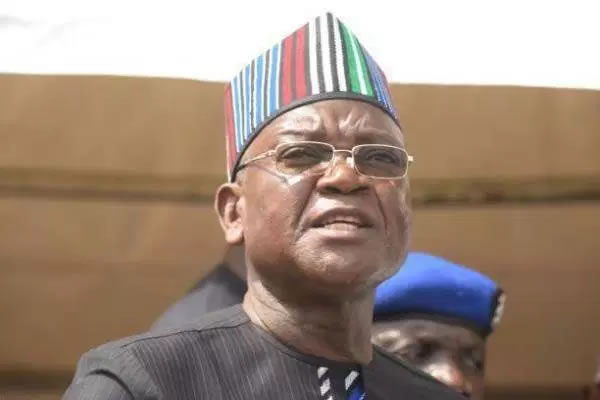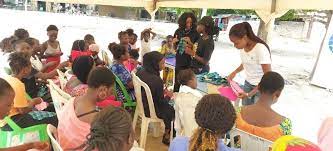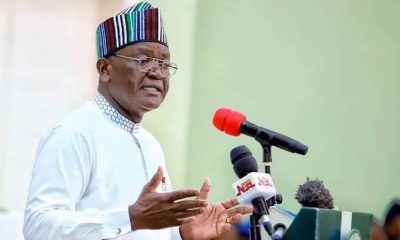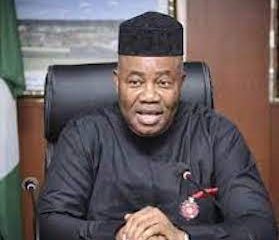OPINION
‘G-5 GOVERNORS,’ 2023 AND ORTOM’S NOVEL “BOTTOM TO TOP” MANTRA

By Tunde Olusunle
Two incidents in the not too distant past, mitigated my physical participation in open-field, free-to-air political events, notably rallies and conventions, in recent times. At a rally of the Peoples’ Democratic Party, (PDP), in Lokoja, the Kogi State capital years ago, I left the venue of the event, relatively lighter than I went.
My prized mobile phone had been pinched from the pocket of my national dress I donned to the event. It was an experience I had never had. With most of us almost wholly dependent on our electronic gadgets for day-to-day functionality, I felt like an orphan having been so criminally dispossessed of my device, for 24 subsequent hours. This was the time span between the pilferage of the equipment, and its eventual replacement. The second experience occurred as I queued to access Eagle Square, Abuja for the convention of the same party in 2017. I least imagined that the wad of currency notes I supposedly secured in one of the less visible pockets of my smart dress, could be so neatly, albeit criminally accessed!
On the recent invitation of the much-misunderstood governor of Benue State, Samuel Ioraer Ortom, however, I broke my subsisting self-censorship. I honoured the flag-off of the Benue State PDP campaigns, held in Makurdi the state capital, on Monday November 7, 2022. Candidates of the PDP contesting for various positions, at all levels in the February and March 2023 polls, were to be formally presented to the PDP family in the state. My longstanding friend and brother, Tivlumun Nyitse, Chief of Staff to Ortom, was the ideal host, on behalf of his Principal.
The pre-event sensitisation was massive. Ortom’s colleagues, who have come to be known as the “G-5,” or the “Integrity Group” as they are interchangeably referred to, in contemporary political discourse, were to headline the event. Nyesom Wike, Seyi Makinde, Okezie Ikpeazu and Ifeanyi Ugwuanyi of Rivers, Oyo, Abia and Enugu respectively, would be storming the “Food basket of the nation,” the legend of Benue State, for the programme. They were coming to stir the Benue river, calmer now than weeks ago when its flooded banks chased the people from their homes and farmlands. The quintet have been vocal and unanimous in speaking up against issues they consider unjust and unfair, in the current structure and operations of their party, vowing never to back-down until their demands are addressed. The issues are public knowledge, and need no rehashing.
The airport at the typically sleepy “Nigerian Airforce Base,” Makurdi, came alive in the evening of Sunday November 6, 2022. Four private jets, each conveying Ortom’s guests, lit up the concreted face of the typically snoozing tarmac. Chief host Ortom would settle his guests in at the recently rehabilitated “Aper Aku” Lodge in Government House, christened after the Second Republic governor of the state. Aku is credited with several multi-sectoral innovations, during his short lived four year term in office. Aper Aku Lodge is an innocuous, yet voluptuous complex with about 25 rooms, backing the Presidential Lodge within the Government House. After dinner with his guests in his own section of the Government House behemoth, Ortom -led his guests on a short walk to the “Banquet Hall” for a reception.
Benue State’s well-known affluent culture was on display. Dances and performances from the major ethnicities in the state, the “Tiv,” “Idoma,” “Igede” and “Agatu,” featured at the event. Ortom’s August guests responded by nodding their heads to the rhythms of music and the footwork of performances, intermittently applauding the performers. Ortom proclaimed the adoption of his guests as *honorary citizens* of Benue State, requesting that the proclamation be recorded in relevant instruments of the government. Wike, Ikpeazu, Makinde and Ugwuanyi were subsequently robed in traditional Tiv attires, complete with ceremonial spears. They took to the dais themselves, and shuffled to the rhythms and songs.
Ortom’s guests woke up the next morning, to a tour and simultaneous commissioning of projects in the state capital and its environs. It was an opportunity for Ortom to beam to the world, some of the infrastructures he had developed for his people. “Dr,” he called me as we chatted, “I find it amusing when people accuse me of not building even a simple bathroom in all my years as governor. I think it’s because I’m media shy. My upbringing and religious inclination, also forbid my blowing my own trumpet.” Ortom continued: “Again, I’m by nature a frugal person. If I reckon that the cost of commissioning a particular project can help us build a culvert somewhere, or a borehole elsewhere, that is more important to me than the fanfare of showcasing things we’ve already put in place.” And Ortom does have a commendable collage of infrastructures to flaunt before the eyes of his August guests and constituents, variously.
They include: The 9.4 kilometre “Tse Poor- Mbakya-Apir road and electricity project,” named after first ever Speaker of the Benue State House of Assembly Ayua Num, which was commissioned by Wike. The 7.7 kilometre “Tse Poor-Mbanima-Yaikyo road and electricity facility” named after Sule Abenga, the late “Ter Makurdi,” was commissioned by Ugwanyi, while the 3.2 kilometre *NKST- Yina- George Akume” road named after the charismatic Joseph Waku, a prominent Tiv leader, was commissioned by Makinde.
A two-kilometre Kaange Akaya- Lucy Aluor- Otukpo road, christened after Wike, was commissioned by Ortom’s predecessor, Gabriel Suswam, who is now a Senator. The two kilometre road runs behind the Commissioners’ Quarters in Makurdi, the state capital. Instructively, the road leads to the residence of Iyorchia Ayu, Chairman of the PDP, with whom the “G-5” have been in the trenches for six months now. This is not overlooking the one and half kilometre “Low Cost Housing Estate-Banban road,” named after Chief JC Obande, a revered Idoma leader, which was also commissioned on the same day.
The “IBB Square,” Makurdi, named after Nigeria’s former military President, Ibrahim Badamasi Babangida is the equivalent of Abuja’s “Eagle Square” and the prime open-air events arena in the state. It was packed full and overflowing into adjoining streets as early as 10am, Monday November 7, even when the city’s ears were yet tingling to the fusion jazz of car honks and sirens, as Ortom and his guests toured various project sites. It was a carnival of PDP colours, a convergence of political greats who headline the politics of the state, and indeed the North Central geopolitical zone.
The “VIP” section of the events place, had a pleasant challenge, contending with the visiting governors, and the “Who’s Who” in Benue State politics. Except for a very prominent political figure in the state and in Nigeria, former President of the Senate, David Mark who is bereaved, and Ayu, still in the eye of the storm, the roll call was as comprehensive as it was astounding.
The sun was sky-high and blistering, foreheads and faces dripping with grime and perspiration. But these were no deterrents to mammoth assemblage at the Square. Beginning with Ortom’s beautiful and indefatigable wife, Eunice, dignitaries at the event included the deputy governor of the state, the immensely humble and unassuming Benson Abounu. Suswam and his senator colleagues from the state, Emmanuel Orker-Jev and Abba Moro, respectively, were in attendance. Ortom is contesting for the senatorial seat of Benue North West, as he concludes his two terms as governor, May 29, 2023. To this extent, he is a candidate. Serving members and intending candidates of the lower national parliament, notably Richard Gbande, Robert Tyough, Julius Atorough, Benjamin Mzondu, Terkaa Agba, Ukah Emmanuel and John Dyegh, were present. Samson Okwu, Aida Nath Ogwuche, Alex Ogbe and Ojotu Ojema, attended the event.
Member of the PDP Board of Trustees, (BOT), Margaret Icheen, acting Chairman of the party in the state, Isaac Mffo and his colleagues in the State Working Committee, were in full attendance. So were members of the Benue State PDP Campaign Management Committee, led by Cletus Tyokyaa. Gubernatorial flagbearer of the PDP in the 2023 election, Titus Uba and his running mate, John Ngbede, featured at the programme. Elder statesman and former Minister of the Federal Republic, Iyorwuese Hagher, and former presidential aide, Mike Mku, equally found time to grace the rally.
Speaker after speaker restated the imperative for all hands to be on deck for the decisive ouster of the seven and half year old regime of the All Progressives Congress, (APC), which has irreparably traumatised Nigeria. Ortom deployed the opportunity to recast the 2015 electioneering slogan by erstwhile APC flagbearer Muhammadu Buhari, Nigeria’s outgoing President. Buhari had intoned in his now famous backlash of a speech at the time, that the “APC will take Nigeria from top to bottom!” Sadly, Buhari’s underwhelming performance over the years, has given a new meaning to that evergreen utterance. It has been interpreted in contemporary political disputation to imply his prophetic resolve to take Nigeria literally from socioeconomic ascendancy, to the valley of all-round poverty, destitution and ignominy.
Ortom’s new mantra proposes a “bottom to top” political prototype.
This anticipates the holistic triumph of the PDP at all levels, beginning from the polling units, through the wards, to the local government areas, onwards to the state, and the federal level. To this extent, the PDP will work towards excelling from the offices of councillors, through local government chairmen, to state assembly members, to federal parliamentarians, to the governorship, and onwards to the presidency. In doing so, Ortom restated that the PDP will not kick away the ropes and ladders with which it sought and received support for ascent to the mountain top. Everyone, every structure from the minutest levels will receive adequate shelter and accommodation under the infinite umbrella of the PDP. Development and dividends of democracy will be fairly apportioned.
Those who expected brickbats and missile-hurling at the event, against the backdrop of the subsisting bad blood between the G-5 and the larger PDP, were most probably disappointed. While expressing his disaffection with the management of rifts and schism within his party, a very realistic Ortom admonished people to vote for their preferred candidates and parties in the coming polls. This must have arisen from his recognition of the dispositions of other party leaders and stakeholders in the state, who have affinity with candidates, different from his preference, especially at the presidential level. A window for possible rapprochement to the subsisting intra-party impasse in the PDP, was opened last Wednesday, when the *G-5* visited Bauchi State governor, Bala Mohammed. Wike spoke on behalf of his colleagues, to the effect that his faction remains open to dialogue and reintegration.
A meeting was reportedly held by Babangida, yesterday which featured Atiku, Aliyu Mohammed Gusau, Okowa, Aminu Tambuwal and former governors Olagunsoye Oyinlola, Bonnie Haruna, Babangida Aliyu, Sule Lamido, Emeka Ihedioha, among others. It may be the eventual olive branch in the mitigation of the subsisting, long-drawn saga. The PDP realises the imperative of confronting the 2023 test as one united family, and will stop at nothing to secure the buy-in of every relevant stakeholder. The APC has adorned itself with ample inflammable oil for comprehensive barbecuing in the 2023 polls. Even at that, the PDP will do better as an undivided, indivisible “combat unit,” to deploy a military terminology.
Tunde Olusunle, PhD, Poet, Journalist, Scholar and Author, is a Member of the Nigerian Guild of Editors, (NGE).
OPINION
Of Randy Lecturers and Their Students

By Zayd Ibn Isah
One of the worst things to happen to a country’s educational institution is to have teachers and lecturers who cannot tame their sexual urges around students. Surely, such a country’s educational system will end up breeding students who are not only vulnerable, but possibly dysfunctional and likely to continue the heritage of abuse and mediocrity.
And why wouldn’t this be so, when such students were deprived of the safe and conducive learning environment which is the basic right of any student seeking enlightenment.Normally, schools and other educational institutions, whether at primary, secondary, and tertiary levels, are supposed to be hallowed citadels of learning.
Within them, students are trained and equipped with the tools needed for them to become leaders, critical thinkers, and agents of positive change in society. This ensures that beyond the walls of the school, students would have imbibed enough moral instruction to contribute to national development.However, when these institutions are infiltrated by predatory lecturers who sexualize students for their depraved gains, campuses become jungles where only those who are ready to play by the rules survive, establishing a hierarchical sense of predatory dominance over helpless prey. As such, those who are not ready to submit to the whims and caprices of randy lecturers are frustrated, and their dreams of acquiring knowledge to better their lives quickly turn to ashes. When these things happen, the very essence of education is tarnished, trust in academic institutions is shattered, and the potential for meaningful learning and personal growth is gravely compromised.
Recent events unfolding in our tertiary institutions call for grave concern. Last month, a lecturer at the University of Nigeria, Nsukka (UNN), was caught in the act of trying to sexually molest a female student at the university. The predatory lecturer’s victim is even married, but this was of no concern to the lecturer, Mr. Mfonobong Udoudom. Although his act is no less severe regardless of the victim’s marital status, one would have expected the man to act more like a professional and shun the act altogether. But apparently, such reasoning and logic must have eluded Mr. Mfonobong Udoudom at the level of depravity he no doubt felt comfortably assured within.
The irony of the whole situation is that the lecturer works at the General Studies Programme (GSP) Unit of the university, where he teaches Peace and Conflict Resolution and Nigerian People’s and Culture. I wonder if he thought anything at all about what his actions could mean to the outside world, especially about the Nigerian people and our culture, by threatening to fail his student if she fails to yield to his sexual advances. Did he ever think on how, by pushing ahead with his evil agenda, he would have been implying that in Nigeria, part of the educational culture maintains that students must sleep with their lecturers in order to pass exams?
According to reports, the lecturer is notorious for sleeping with his students to pass exams. In fact, once he sets his interest in you, it doesn’t matter how many hours you spend reading his courses and attending his lectures; as long as you have not followed him to the other room for practicals, you are on your own. But as the saying goes, every day for the thief, one day for the owner.
Even the king of the jungle runs out of luck eventually. And so it went for Mr. Mfonobong. It appears his alleged victim arranged with her husband and others to get the man into a trap, and part of the strategy was for her to play along. This is why, just when the lecturer thought his food was ready, the tables were turned against him and everything came crashing down hard.
“You can see. We have been following this case from day one. We have all the tracks, all the voice notes and everything,” a voice said in the background of the viral clip that was posted on social media to document Mr. Udoudomʼs disgrace.
This was the same strategy that was used for another predatory lecturer desecrating our citadel of learning. Mr. Theodore Shey, a lecturer at the Department of English and Literary Studies, Federal University, Lokoja, was caught in his house while trying to sleep with a female student. According to reports, the lecturer had been on his victim’s neck for sex, but the lady failed to yield. He failed her as a result. She reported the matter to her father, and she was told to play along. And that was how the cookie crumbled for Mr. Theodore.
There is a popular adage that if the hunter learns how to shoot without aiming first, the bird will also learn how to fly without perching. While it may seem that these predatory lecturers are beginning to get their comeuppance, it is quite unfortunate that we are still talking about sex for grades in our schools and that this is happening at a time when parents are encouraged to educate their girl-child to foster an environment of safety and respect. Our campuses are supposed to be a sanctuary for female students, not a jungle where predatory lecturers prey on their bodies.
Although there have been concerted efforts to tackle the menace of sex for grades by the government, at the wake of the BBC Eye undercover investigations into the activities of lecturers in both Nigerian and Ghanaian universities in 2020, The National Assembly passed a bill for the prohibition and punishment of sexual harassment by teachers/lecturers in tertiary institutions.
Unfortunately, this law, like every other law criminalizing crimes in Nigeria, does not deter some lecturers from sexually harassing their students. According to a recent report conducted by Women Advocate Research and Documentation Centre (WARDC) with support from the Open Society Initiative for West Africa, the rate of sexual harassment in our schools remains high, and it is not just a case of lecturers to students; it is even more prevalent among students, likewise non-academic staff.
The report observed that, “There are different manifestations and prevalence of SGBV among different categories of people in the university community. All forms of SGBV are present on campus and with unacceptable frequency. The most prevalent forms are sexual harassment followed by rape. The main perpetrators of SGBV are predominantly students and academic staff, although it is also common for non-academic staff to sexually harass students during the admissions process and when securing accommodation. There is also grossly under-reported sex for promotion and other SGBV amongst staff.”
What this suggests is that a lot needs to be done to stem the tide of all forms of sexual harassment in our schools. There should be an avenue for victims to report incidents of sexual harassment without the fear of victimization. Those caught in the act of sexual harassment should be prosecuted to serve as a deterrent to others.
Only through punitive measures can we maintain the sanctity of our educational institutions. And these recent incidents should not serve as an avenue for people to surface and blame the scourge of sexual harassment in schools as consequences of indecent dressing. Even if female students were to be restricted to the hijab in terms of dressing on campuses, corrupt minds would still fantasize, lust and scheme to perpetrate dastardly acts.
As much as students are expected to dress decently as a reflection of their duties within the school environment, staff should be held up to much higher standards of professionalism, morality and duty. If we must get things right and eliminate the malaise afflicting our learning spaces, everyone must be held to the highest standards and expectations. By doing this, excellence will thrive and mediocrity, along with inane depravity, will become a thing of the past in our educational institutions.
Zayd Ibn Isah can be reached via lawcadet1@gmail.com
OPINION
WANTED: A STATE OF EMERGENCY ON COST OF GOVERNANCE

By Tunde Olusunle*
The lobbies and lounges of the *Nicon Hilton Hotel* (now *Transcorp Hilton)* and *Sheraton Hotels and Towers,* (now *Abuja Continental Hotel)* were very boisterous in the early days of the Olusegun Obasanjo/Atiku Abubakar administration in 1999. Both hotels were the biggest and best, those years and they accommodated the cream of the political class who gravitated to the federal capital territory, (FCT) at the outset of the Fourth Republic.
Conjectures, rumours and spins swirled in the breeze of both hotels throwing up the names of potential ministers, advisers and prospective government functionaries. As the names of potential top-ranking operatives became public, the question arose about the number of aides they would each be entitled to, and where such assistants will be sourced from. The civil service was poised to populate as many positions as may be thrown up in the new dispensation. They fancied themselves a reservoir of trained and ready bureaucrats who could be called upon at the snap of two fingers, the way a military parade is summoned by the sound of the bugle.First, it was proposed that appointees at the level of minister and adviser were entitled to two aides, a “Special Assistant” at the level of Deputy Director on Grade Level, (GL) 16, and a “Personal Assistant” at the level of a “Chief” in the civil service on GL 14. But for the insistence of senior and influential members of the emerging Obasanjo administration, the civil service would have had its way. For an Obasanjo who is famous for frugality, whatever governance model which would conserve resources for government, suited his desires. The President was, however, reminded that the minimum compensation that could be accorded the foot soldiers who made his ascension possible, was to avail some of them positions in the new government.
Obasanjo was also admonished about the fact that democratic governance as different from an insular military government, should expand the space for qualified and competent Nigerians by way of sustainable engagement. Members of the national assembly agreed mutually that they should each have five legislative aides, who were of necessity drawn majorly from their home constituencies for obvious reasons. With a total of 469 in both chambers of the federal parliament, over 2000 jobs had thus been created. If Obasanjo’s cabinet was to be composed of 42 members and each of them took two people from the unemployment market, such tokenism will at least keep many hands from becoming workshops of devil.
Since Obasanjo was a newcomer to popular politics who was still undergoing demilitarisation from his erstwhile professional fixations, the new President was also reminded he could seek reelection in 2003, as provided for by the 1999 Constitution of the Federal Republic of Nigeria. If he nursed any such ambitions, the real groundsmen at the grassroots in the polling units, the wards, the local government areas, the federal constituencies and so on needed to be practically cultivated. If they were not physical appointees themselves they will be glad enough that they have their eyes and ears where decisions concerning them were being made. Obasanjo consented and to a substantial extent, his prototype was in place until the expiration of his rulership in 2007. In several instances, qualified loyalists of the party were also appointed and deployed to departments and agencies under the supervision of various ministers.
Obasanjo’s equally frugal successor, Umaru Musa Yar’Adua inherited and ran with his benefactor’s template. Yar’Adua by the way, purportedly appealed to Obasanjo as baton-changer among other reasons, because of his predilection for thriftiness. In the course of Obasanjo’s state visit to Katsina State Yar’Adua’s erstwhile address as governor in 2002, the former Nigerian leader was delighted with Yar’Adua’s good works as with the impressive balance sheet of the state. Obasanjo has also noted elsewhere that he was also swayed in the direction of Yar’Adua because of the absolute loyalty with which Umaru Yar’Adua’s elder brother, Shehu, served him when he was military Head of State. He desired to honour the memory of a colleague who died desiring the democratisation of his country and on whose political platform he largely profited en route the presidency. Atiku Abubakar was Yar’Adua’s de facto Number Two man in the Peoples’ Democratic Movement, (PDM). He it was who led that critical political tendency to coalesce with other groups, to become the bedrock of Obasanjo’s success in the 1999 presidential poll and thereafter.
A certain liberalisation of the preexisting archetype of engagement of personal aides by top appointees began to take root during the administration of Goodluck Jonathan. He succeeded Yar’Adua who passed away in May 2010 and was somewhat soft on certain goings-on in the governance apparachik, his gaze trained on a shot at the presidency on his own steam in 2011. Call cards in the public domain during that era reportedly alluded to new coinages in the Jonathan milieu hitherto unheard of. His police aide-de-camp in his years as Vice President, Matthew Jitoboh, for instance gave way to a military officer, Ojogbane Adegbe, following Jonathan’s concurrent designation as President, Commander-in-Chief. Rather than report to the Inspector-General of Police, (IGP) for redeployment to regular police duties Jitoboh transmuted into a “Chief of Personal Security to the President” under Jonathan’s watch! What with the numbers and diversity of security personnel who hitherto secured the seat of government? Every such needless creation, pitched for operational resources thereby diminishing government capacity to provide basic services and infrastructure.
Things went on a perverse descent with the advent of Muhammadu Buhari as President in 2015. Buhari was never famous for hands-on leadership, a fact which soon became very evident as his rulership began. Ministers, advisers and so on were at open-ended liberty to populate their schedules with as many aides as they desired. Some public officers indeed fancied a whole bureaucracy of personal aides which could include a Chief of Staff! There could also be: Special Advisers; Special Assistants; Technical Assistants; Personal Assistants; In-house Consultants; Resource Persons and so on, engaged by top government officials. Buhari, renowned for never being *awia* of goings-on around and about him, was not in a position to check or moderate such excesses. Sadly but interestingly, government at sub-nationals like the local government level, equally ape existing precedence at the higher rungs. They cram up the space with all manner of frivolous appointments. Local government chairmen also have their chiefs of staff and a retinue of preposterous aides all remunerated from resources transmitted from the centre. It got so bewildering in my local government at some point that the “wives of councillors” were allegedly paid a month’s stipend of N50,000 monthly, for being “first ladies of their wards!”
Government finances are strained by these overloads which come with specific fiscal requirements. Emoluments have to be paid to those purportedly offering services to government; residential quarters or hotel accommodation has to be provided for them; means of travel have to be provided or paid for. Where such officials are allocated official vehicles and there is a shortage of chauffeurs in the pool, new drivers are hired, the costs consolidated on the hunchback of government. The entourage of our modern-day big men on local or foreign travels ballooned with appropriate *per diems* or estacodes, imperative. Officials themselves concot all manner of trainings, conferences and similar offshore engagements, flying in comfy classes. They savour the best hospitality facilities in their global junketing at our collective expense and the discomfiture of our already be-laboured resources.
Despite this dampening scenario, unfeeling officials prefer foreign destinations for such mundane convergences as interactive workshops and meetings. Early March this year, the Accountant-general of the Federation, (AGF), Oluwatoyin Sakirat Madein herded Commissioners of Finance from the 36 states and FCT to the United Kingdom for an early-in-the-year rendezvous, in the name of a week-long workshop! The theme of that engagement was “Public Financial Management International Public Sector Accounting Standards,” (IPSAS). The AGF who should be better apprised than the rest of us about the country’s most disturbing fiscal situation was the orchestrator of yet another pipe-leak in the name of a foreign engagement for the nation’s exchequers.
Last April, governors of 10 Nigerian states congregated in the United States to discuss security issues ravaging their various states! All governors from the North West: Sokoto, Kebbi, Zamfara, Kano, Jigawa, Kaduna, Kano and three states from the North Central, Benue, Niger and Plateau, participated in the three-day parley. If their homes have become metaphorical furnaces in the grips of bandits, kidnappers and similar miscreants, couldn’t they have moved over to another state, say Akwa Ibom which would provide the necessary serenity and security for engagement? The resource persons with whom they engaged in the United States could as well have flown to Nigeria.
Public officials are not sparing a thought for the sustainable rehabilitation, upgrading and operationalisation of our existing touristic capital and other facilities which should easily earn foreign exchange for the country. What happened to the *Obudu Cattle Ranch* and the *Tinapa Resort,* both in Cross River State? The state indeed opens the window to a myriad of other pristine treasures including the *Slave History* and the *Old Residency* museums; the scenic *Tortuga Island,* not forgetting the archival home of the famous female Scottish missionary, *Mary Slessor.* What have we done with the *Yankari Game Reserve* and the *Kainji Wildlife Park* in Bauchi and Niger states, which harbour some of the world’s rarest fauna? How about the *Lekki Conservation Centre* and the *Badagry Coconut Beach* overlooking the regal Atlantic ocean, both in Lagos State?
Under President Obasanjo, Abuja became the unofficial “conference destination” in Africa. It subtly displaced Cairo, Johannesburg, Nairobi, even Kigali in the contest for this designation. Back in 2003, Nigeria very competently hosted the *18th Meeting of the Heads of Government of the Commonwealth of Nations, (CHOGM),* which was attended by the Head of the Commonwealth, Her Majesty, Queen Elizabeth II at the time. Fifty one out of the 54 Commonwealth member countries attended meeting, a measure of the global regard with which Nigeria was viewed. Today, however, our senior officials are ever pliable in flashing cigarette lighters to our very scarce resources, in their oftentimes frivolous gallivanting. They don’t seem disposed to helping to build our own endowments to the world class standards which will compel the world to come probing.
Last January, Bola Tinubu, Nigeria’s President directed the reduction of the number of officials on his entourage to foreign destinations to 20. This was in response to public outcry about Nigeria’s typically overblown delegations to offshore events. This cutback was also extended to the travels of his deputy. In March, Tinubu issued a presidential order restricting foreign travel by government functionaries for an initial period of three months, starting from April 1, 2024. While these measures are commendable, government needs to take a holistic view of the question of unsustainable public spending particularly in a milieu when government is gasping for fiscal oxygen.
All arms of government are directly or indirectly guilty of various infractions on the national till. Justices of the Supreme Court of Nigeria mid-2022, petitioned the Chief Justice of Nigeria, (CJN), Tanko Muhammad. Led by the incumbent CJN, Olukayode Ariwoola, the judges correspondence stopped short calling out seething malfeasance under Muhammad’s watch. Nigeria’s parliamoent remains the most pampered anywhere in the world, presumably operating a most opaque accountability regimen. Mammoth sums are voted for the procurement of bulletproof, luxury automobiles for leaders and members of Congress. The President of the Senate, Godswill Akpabio is said to have dozens of aides servicing his office in the name of “inclusiveness.” He never probably met most of them and may never do. We are told inexplicable provisions are made for “constituency projects” which are directly overseen by the legislators themselves. This subhead is said to have become a conduit for the pilferage of public resources.
Wasn’t Abdul Ningi, a ranking congressman representing Bauchi Central recently suspended for playing the whistle-blower on the expenditure proclivities of the same parliament to which he belongs? Undocumented allowances are made for the various breaks and holidays of parliamentarians, the type described as “prayers” by the Senate President the other day. Let’s not forget the jumbo millions in foreign exchange which the federal government annually votes for some agencies of government, a part of which was found cooling off under uninterrupted air-conditioning in a flat in highbrow Ikoyi, in Lagos, a few years ago. In that 2017 incident, $43.4m; £27, 800 and N23.2m, totalling N13 Billion at the time, were discovered in that singular instance!
Pointed and pragmatic pruning down of government expenditure transcends piecemeal orders and instalmental directives. Government should ideally declare a “state of emergency” on public expenditure which should bring all the arms of government at various levels of administration to a roundtable. More than ever, it is necessary for us to lay the issues bare, agree on subsisting profligacy in governance and administration, and deploy the scalpel without sentiments and biases. We must agree we’ve been collectively profligate. We must concur to the fact that there are services and developments we can avail our people without the humongous budget paddings which have become the norm. We must re-commit to serving the mass of our citizens to whom we are primarily obliged. We must re-dedicate to working for this country with every altruism. We must be resolute in exerting ourselves for its sustainable growth, to the standards of other forward-looking nations.
*Tunde Olusunle, PhD, is a Fellow of the Association of Nigerian Authors, (FANA)*
OPINION
Period Poverty: Prioritizing Menstrual Health in Nigeria’s Policy Agenda

By Halimah-Sa’dia Nuhu Sanda
As a predominantly healthy biological phenomenon and the most universal and peculiarly womanly experience, menstruation should not be a barrier to education or hinder a girl’s ability to participate fully in daily life. Yet for millions of women and girls in Nigeria, it does.
In fact, every month, thousands of adolescent girls and women in the world struggle to cope with their monthly periods.
This is because many of these girls cannot afford or access appropriate menstrual products and depend on crude, improvised materials for managing their menstruation, such as bits of old clothing, foam mattress, toilet paper, leaves, and banana fibers. These improvisations are ineffective and uncomfortable.For many girls, the first experience of menstruation is associated not with knowledge and understanding of the normal biological process but with confusion, shame, and a poor quality of information on how to deal with it. Even today, the menstrual process is heavily stigmatised in Nigeria, preventing girls from engaging in regular activities.
A lack of decent sanitation and menstrual hygiene facilities in schools creates barriers to attendance even for girls who can afford supplies at home. Every girl deserves the opportunity to pursue her education and develop to her full potential without the restrictions that her biological cycle imposes.
With a combination of frequent, embarrassing leaks, a susceptibility to recurrent infections, the stigma surrounding menstruation, and the lack of proper information and sanitary materials available, millions of girls and women experience their monthly period as something that prevents them from engaging in daily life, often compelling girls to miss school or discontinue their studies entirely. In a nation where education is broadly accepted as a form of empowerment and socioeconomic growth, the implications of menstrual inequity are particularly insidious.
The bottom line is this: menstruation should be a normal fact of life, not an ailment that steals girls’ futures. However, ensuring menstrual equity for the emerging generation of Nigerian girls and women is more than just a question of rights; rather, it is one of the most dynamic investments Nigeria can create in its development, economics, and human capital. But perhaps the most essential component is that the hideous ripple effects of period poverty on girls’ education amplify gender inequalities and inequities across all spheres.
In January 2020, the Nigerian government took a significant step toward achieving menstrual equity. Sanitary towels, pads, and tampons were exempted from the value-added tax as part of the new Finance Bill signed by then-President Muhammadu Buhari.
According to the statement of the Office of the Vice President, the Nigerian government said, “In a bid to ensure that the cost of living does not rise for Nigerians because of the changes in the Value-Added Tax, several basic food items, locally manufactured sanitary towels, pads have been added to the exemption list.”
This act on the part of the government aimed at relieving financial burdens on women and girls, especially those from economically disadvantaged backgrounds, was an acknowledgment of the natural entitlement to manage periods in decency. Girls and women have a human right to menstrual dignity, and no government should be able to tax our periods by making feminine hygiene products a luxury. For too long, the combined costs of sanitary products and taxes have placed an unfair financial burden on Nigerian girls and women simply for being female.
While the introduction of lower prices for sanitary products is commendable, the harsh reality persists: far too many girls are still unable to access basic menstrual hygiene products due to the financial constraints it imposes. UNICEF estimates that one in ten girls in sub-Saharan Africa misses school during her period; at the same time, as much as 20 per cent of the school year is missed as a direct result of menstrual poverty.
The 2013 National Demography and Health Survey data (NDHS) says about 60 per cent of the 10.5 million out-of-school children in Nigeria dropped out due to period poverty. When adolescent girls are forced to miss weeks of school each year simply for experiencing their periods, their academic performance deteriorates, their economic prospects become bleak, and the resulting ripples can throw their whole future trajectories off course.
The World Bank’s report “A Better Future for All Nigerians: Nigeria Poverty Assessment 2022” estimates that nearly two out of five citizens live below 1.90 U.S. dollars per day as a national poverty line. In contrast, 2019 data from the National Bureau of Statistics shows that 40 per cent of the population in Nigeria—almost 83 million people—lives below the national consumption poverty line, which is N137,430 ($134.73) per annum.
With an average pad price of N550 and the current economic crisis, which has exacerbated the socioeconomic vulnerabilities faced by the poor on all fronts, including the menstrual hygiene crisis, this crisis has never been more pressing.
Studies have shown a correlation between infant mortality and maternal education in developing countries. A 2013 study found that an increase in maternal education could reduce infant mortality rate by 51.2 per cent. According to UNICEF, children of uneducated mothers are 2.8 times more likely to die before the age of 5 compared to those whose mothers have a secondary education.
Another 2019 study in India revealed that infant mortality was 51 per cent higher among children of uneducated mothers. Meanwhile, the 2018 NDHS showed that infant mortality is at 67 deaths per 1000 for mothers with no education, compared to 36 deaths per 1000 for mothers with secondary or higher school education.
This overwhelming evidence indicates that increasing access to education for girls is an effective way of saving the lives of infants in developing countries. An educated mother is less likely to have high-risk pregnancies, more likely to practice essential newborn care, and better prepared to make informed choices about her sexual and reproductive health. If we help our girls and women manage their menstruation easily while keeping them in school, we empower them to become society’s driving forces of change. Quite simply, educated women raise healthier societies.
Many individuals and organisations have undertaken various initiatives to tackle this problem. In 2018, UNICEF, with financial assistance from Canada, trained 40 girls from four senior high schools in Osun State on the production of reusable sanitary pads. There are organisations such as the Pad-Up Foundation and Pad A Girl Foundation. Yet much more funding and nationwide scale are needed to deliver menstrual equity as a norm, not an exception, across the country.
Although the VAT exemption was a step forward, it’s time to redouble our efforts on guaranteeing menstrual dignity to all women and girls. As things stand, there are still systemic barriers preventing the country’s poorest menstruating populations from achieving it.
Experience in other countries has shown that free provision of sanitary pads and tampons in schools, alongside menstrual health education, can be both revolutionary against period poverty and keep a whole lot more girls at school. Subsidizing local production of low-cost, reusable sanitary pads can make them more affordable and sustainable while also giving women entrepreneurs an economic opportunity to create some wealth.
With tight budgets and a lot of development needs, some people may question if sanitary products deserve our top priority, and critics may even argue that handouts create dependence. It is imperative to realise that menstrual equity is not only a woman’s issue; it is a social matter that demands urgent attention.
Every girl has the right to study and the ability to achieve her potential, free from the restrictions imposed by her biology. Therefore, it should be viewed as a right of humanity, not charity. It is an investment in human capital that will appreciate, producing generations of healthier, better educated, and more economically productive Nigerian women.
Half the earth’s population is born with this biological characteristic. By treating period poverty as equally important to public health as other key social determinants, Nigerian leaders will be striking a powerful chord for gender equity. With affordable sanitary protection and education, Nigerian girls will no longer have their dreams and futures derailed each month by something as fundamental as their own biology. The future productivity, wealth, and empowerment of Nigerian girls and women merit such an investment.
Halima Sanda wrote from Kano

























